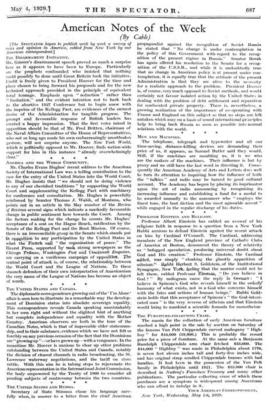AMERICA AND THE WORLD COMMUNITY.
Mr. Charles Evans Hughes' recent address to the American Society of International Law was a telling contribution to the case for fhe entry, of the United States into the World Court. Mr. Hughes insists that e" we should not be doing violence to any of our cherished traditions " by supporting the World Court and supplementing the Kellogg Pact with machinery for conference and consultation. Mr. Hughes is powerfully reinforced by Senator Thomas J. Walsh, of Montana, who points out in an article in the May number of the Review of Reviews, several signs which indicate a markedly favourable change in public sentiment here towards the Court. Among the factors making for the change he counts Mr. Hughes' acceptance of a seat on the Hague Bench, ratification by the Senate of the Kellogg-Pact and the Root Mission. Of course, there is an irreconcilable group in the Senate which stands pat In °Re sition to any participation by the United States in what the French" the organization of peace." The Hearst Press, supported by such strong newspapers as the Chicago Tribune, Washington Post and 'Cincinnati Enquirer, are carrying on a vociferous campaign of opposition. The central point of attack is, of course, the relationship between the World Court and the League of Nations. To these staunch defenders of their own interpretation. of Aniericanism the very name of the League of Nations has become an object
of wrath.
* * *






















































 Previous page
Previous page